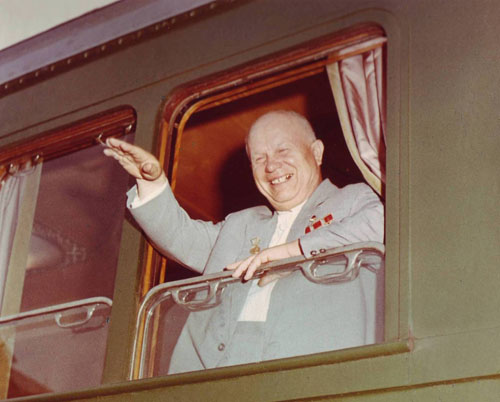
History 01/03/20 N. Khrushchev in 1962 goduco was written in “Khruschev’s” the Constitution of the USSR of 1964, which did not accept
the Soviet Constitution of 1936 was called “Stalinist”. Nikita Khrushchev debunked the cult of personality the previous Secretary General, could not help but want to leave a mark in the history of the new Soviet Constitution. He has already begun preparatory work before its adoption, but did not bring it to the end. In the October 1964 Plenum of the CPSU Central Committee removed Khrushchev from the post of First Secretary of the Central Committee. And already the new First Secretary Leonid Brezhnev (in 1965 the office was renamed again to the Secretary-General, as it was called in the years 1922-1952) was replaced by “Stalin” Constitution of the USSR.
To what extent “Khrushchev,” the Constitution became the prototype of the “Brezhnev”
In 1961, the 22nd Congress of the CPSU adopted a program of construction of communism. And in the next year Nikita Khrushchev gave the order to prepare a new Soviet Constitution, relevant to this program. April 25, 1962 the Supreme Soviet formed a Commission to draft a new Constitution. The Chairman of the Commission was Khrushchev himself. In August 1964 the Commission presented the final draft of the Constitution.
After Khrushchev’s removal, the constitutional Commission continued the work. Brezhnev personally led it in December 1964. Developed a project he didn’t like. The remake took nearly 13 years. As you can see, this thing is not to hurry. Still, in June of 1977 was published the project of the Brezhnev Constitution. October 7, 1977, the Supreme Soviet of the USSR adopted it, as expected, unanimously.
“Brezhnev” Constitution was continuity in relation to non-adopted “Khrushchev” of the Constitution, but still markedly different from her. At the same time, “Khrushchev” the Constitution is very different from the “Stalinist” Constitution.
In the Constitution of 1936 has not been ideological and political in the preamble of the Constitution of 1977 she had, and just as PRaambala was planned in the Constitution of 1964. The content of both the preamble were almost identical, differing only in minor wording. More notable was the stylistic difference: in “Khrushchev” the preamble clearly visible enthusiastic pathos.
And another stylistic contrast is evident when comparing the two texts. In the “Khrushchev” of the Constitution much more than in “Brezhnev”, was said about the upcoming communism. But it was completely absent from the term “developed socialism” that characterized the Constitution of 1977, the actual state of Soviet society. Thus, if the “Brezhnev” Constitution can be called the Constitution “already built developed socialism”, for “Khrushchev” of the draft Basic Law would be better suited to the expression “Constitution of the building of communism”.
Terminology differences
Among the differences “Khrushchev” of the Constitution from the preceding and from that which was eventually adopted, one can identify both terminological and conceptual. The second more interesting, but first finish with the first. For example, Khrushchev proposed to rename the Soviets of workers ‘ deputies in people’s Councils. And the Supreme Soviets of the USSR and the Union republics were supposed to call the Supreme people’s Advice. As you know, Brezhnev was renamed the Soviets to the Soviets of people’s deputies, but the name of the Supreme Soviets of the word “deputies” were not to be used.
Instead of the Councils of Ministers of the USSR and republics, Khrushchev planned to establish Government Boards and Executive committees of local Councils to rename the Bureaux. Brezhnev left for these authorities, the usual names given them by Stalin.
Conceptual differences
In the not-adopted the Constitution of 1964 attracted the attention of some of article 11 of the “people’s Councils”. They have rules, which neither before, nor after was not in the Soviet basic laws. For example:
“Article 114. At every election of members of the people’s Councils of the DEAoleysa not less than one-third. A citizen can be elected to the same national Council not more than three times in a row…”
the Following wording suggests that Khrushchev planned to allow for alternative elections to the Soviets:
“Article 115. The candidate in people’s deputies who have received more than half of the votes of all voters in the constituency”.
And the article 113 for the first time in the Soviet laws mentioned the possibility of promotion not only “for” and “against” any candidate. In “Brezhnev” Constitution, such rules are not passed.
some Interesting innovations, also unprecedented in the published ever Soviet laws contained in Chapter 8 of the constitutional project “fundamental rights of citizens”
“Article 81. Citizens of the USSR are guaranteed freedom of movement and choice of place of residence on the territory of the USSR. Restrictions to this right are possible only on the basis of the law.
Article 82. Citizens of the USSR have the right to travel abroad in accordance with the law”.
the Constitutions of 1936 and 1977, such freedom did not even declaratively.
noteworthy is also the wording of article 75: “Every citizen of the Union and each family is entitled to comfortable housing”. The fact that the housing must be maintained is not provided none of the existing Soviet Constitution and the current Constitution of the Russian Federation.
the Constitution of the USSR, 1964, in accordance with the idea of the withering away of the state under communism had provided for a more broad use of direct democracy. This was the subject of a Chapter 12 “Direct direct popular rule.” Its manifestations were divided into three categories: people’s Assembly in places of residence and labour collectives, public discussion and referendums. Changes to the basic provisions of the Constitution could be made only through a referendum after the public discussion. The words “Soviet socialist state of the whole people” became the title of the 1st Chapter (of the 1977 Constitution they savewere eaten only in the text of the 1st article).
the Powers of public authorities could, in some cases, by law, be transferred to public organizations. This was also done in accordance with the concept of “transition to communism”. From a modern point of view, however, this rule is easy to discern the ground for extralegal arbitrariness.
Some of the language of citizens ‘ rights was harsher than in “Stalin” and “Brezhnev” Constitution, focused on the subordination of the interests of the group and the dominant ideology. It concerned, first of all, rights to personal property and individual labor activity, and also based on the freedom of conscience from those of the “atheist education”.
Finally, the definition of the Communist party as the “leading and guiding force of Soviet society”, appeared in “Khrushchev” project of the Constitution.
Yaroslav Butakov
Source:
© Russian Seven
Recommended statesalaska… Share: Comments Comments on the article “What was written in “Khruschev’s” the Constitution of the USSR of 1964, which did not accept” Please log in to leave a comment! br>
Share on Tumblr
















